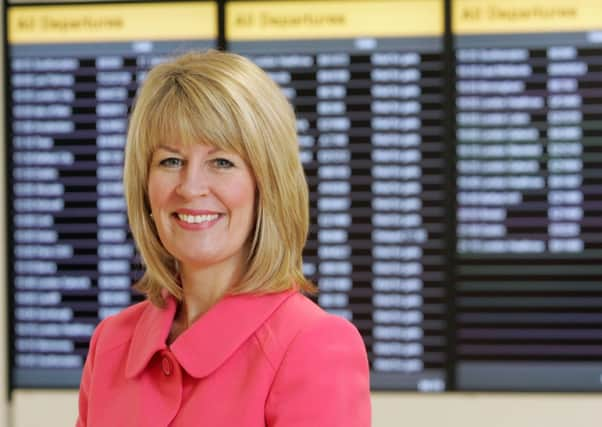Airport chief McMillan’s ready for Glasgow 2014


Representatives from the organising committee are establishing a hub to meet and greet the “Games family” which extends to some 6,500 people travelling in from more than 50 countries. Most of them will make their way through Glasgow Airport, giving managing director Amanda McMillan plenty to contend with.
It’s not just a matter of numbers, but also what McMillan describes as the “technical challenges” of catering to athletes, officials, dignitaries and the media. All have their own specialist kit and requirements while in transit. It will give “a bit of a lift” to passenger numbers, but McMillan notes that the majority of Games tickets were sold within the UK, so there won’t necessarily be a huge jump in July and August. That said, neither are the Games expected to significantly disrupt normal traffic flows.
Advertisement
Hide AdAdvertisement
Hide Ad“The Olympic Games in London witnessed that kind of effect, where people stayed at home to watch,” McMillan says. “Given the sheer seasonality of our business, I expect most of our usual summer travellers will still go on holiday. They might cluster before or after the Games, but we are not expecting that suppressing factor, and we are hoping for some uplift.”
A further boost comes in September, when Scotland plays host to golf’s most prestigious team event. “We do expect more overseas visitors for the Ryder Cup,” McMillan says. “That is a different kind of customer profile – Icelandair has already added capacity to meet demand for the competition.”
It’s all part of the extended recovery at the airport, which seven years ago lost the title of Scotland’s busiest hub to east coast rival Edinburgh. Figures released last week show that Glasgow trumped Edinburgh’s growth in May with a 4.3 per cent increase in annual passenger numbers. Additional seats on Thomson, Lufthansa and KLM flights to Europe, plus extra seating on US Airways and Virgin Atlantic routes to the US, saw 693,000 pass through the gates at Glasgow. Numbers at Edinburgh rose by a more modest 3.5 per cent, but were still substantially ahead at 937,000.
Though born and raised under Glasgow Airport’s flight path at Linwood, McMillan grew up ensconced in the automobile industry that employed her father and many others in that town until the early 1980s. She qualified as a chartered accountant with KPMG in Glasgow before going on to work for meat casings firm Devro and the spirits group Diageo.
She left Diageo to join what was then BAA in 2005, moving between business support services and operations director at the airport. She was appointed managing director in 2008, and within an hour of taking on that role, Zoom Airlines was close to collapse. McMillan was left to negotiate discussions between the airline, the Civil Aviation Authority and European and UK air traffic controllers following the detention of Zoom aircraft at Glasgow.
“The job really did change overnight, and the business changed overnight,” McMillan recalls. The owners of an aircraft, the mechanics who maintain it, airports and other agencies such as air traffic controllers can hold liens on a plane. If an airline fails to pay its bills, lien holders can have the aircraft seized.
McMillan quickly got accustomed to navigating such tricky discussions as the collapse of low-cost carrier XL, which followed hard on the heels of Zoom’s demise. However, the biggest blow came a year later when Flyglobespan hit the buffers, taking with it one-eighth of the eight million passengers going through Glasgow Airport annually.
“It hurt the most because it was a Scottish company, and they employed a lot of people locally,” she says. “Watching the passengers getting off the plane confused, watching the workers go home and know that they are never coming back – I don’t think it can get any lower than that in this industry.” By 2010, passenger numbers at Glasgow had fallen to 6.3 million per year. Despite quickly scrambling to fill most of the gap left by Zoom and XL, there was no shortcut to offsetting the demise of Flyglobespan.
Advertisement
Hide AdAdvertisement
Hide AdMcMillan and her team secured an initial deal with Jet2 in March 2011, and that agreement has since expanded from two aircraft serving seven destinations to five aircraft and 24 destinations. Passenger numbers have climbed steadily for the past three years to reach 7.4 million in 2013, earning McMillan an OBE for successful expansion in a difficult economy.
Part of this goes back to her obsession with customer service – “that was something we could control”. She has encouraged the 450 people she employs directly to lead the way in setting an example to the wider community of 4,500 people working for contractors and other agencies in baggage handling, security, retailing and so forth.
That effort has paid dividends as European networks and long-haul routes have returned to health. Now on course to steer Glasgow Airport back to pre-recession levels, McMillan is intent that will not be derailed by Prestwick Airport, which the Scottish Government took over at the end of last year.
An update on the Government’s plan for the troubled Ayrshire hub is due later this month, but parts of the full report by finance expert Romain Py will be withheld to protect commercially sensitive data. McMillan says she would simply like to have some clarity on whether the airport’s future will hinge on passengers or ancillary services.
“Airports have huge fixed cost bases, so our priority is always to grow passenger numbers and make best use of our resources,” she says. “The more passengers I have the more competitive I am, so from that perspective what happens at Prestwick is very important to us. Prestwick being propped up through subsidies and playing in the same space for passengers as us is not a level playing field.”